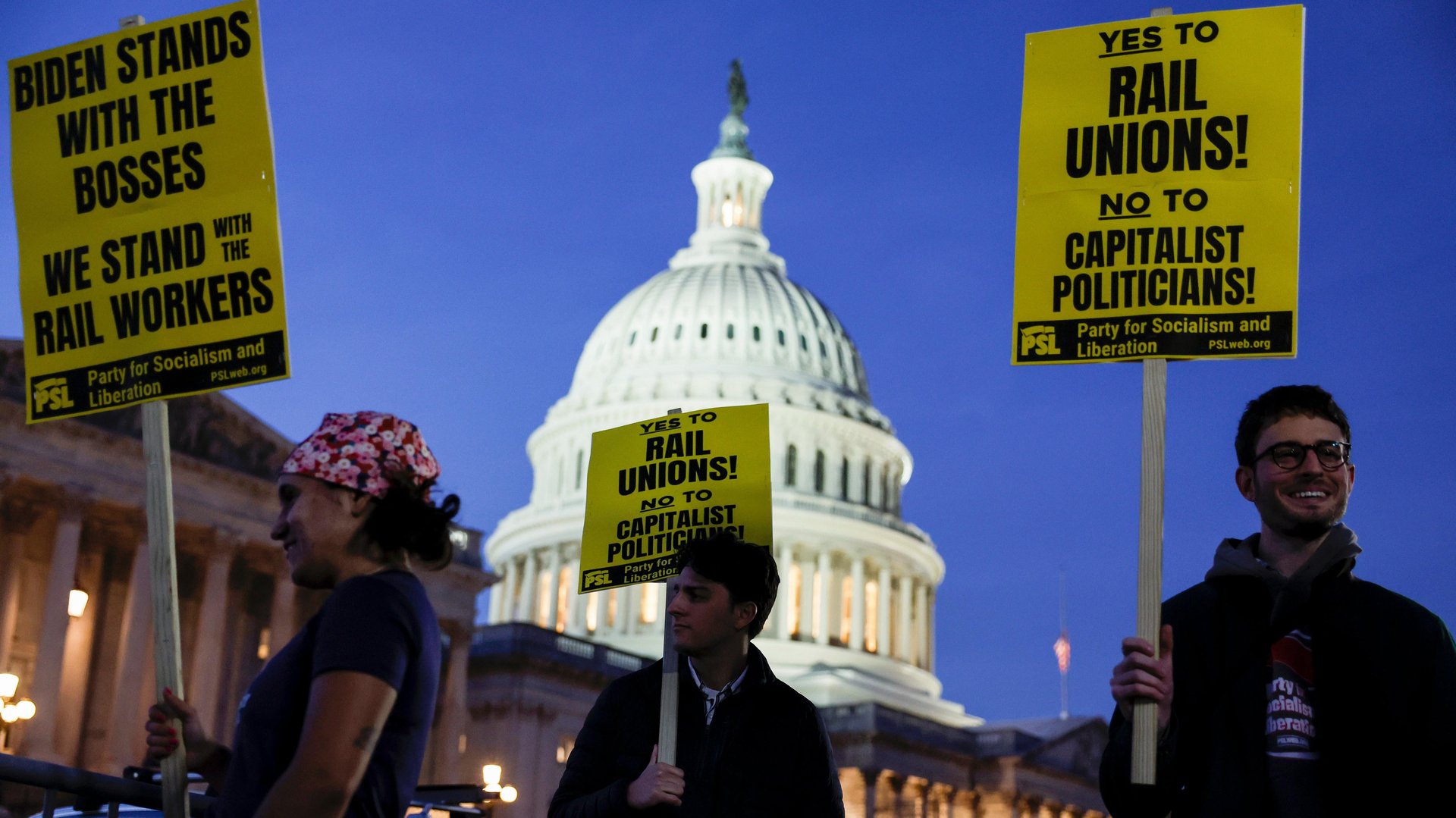To avert a US rail strike, the ball is in the Senate's court
The House voted to impose the September tentative agreement, but with an extra seven days of sick leave

A dozen unions representing 115,000 rail workers have failed to agree unanimously to the terms of an agreement proposed in September. If even one refuses to get on board in the next eight days, all of them will go on strike.
Suggested Reading
Citing the crippling effects of a freight railway strike on the economy—a cost of a devastating $2 billion daily—US president Joe Biden called on Congress, on Nov. 28, to intervene, avert the strike, and impose the agreement nonetheless.
Related Content
On Wednesday (Nov. 30), the US House of Representatives approved a bill to block any stoppages in railroad work by enforcing the agreement. The bill now moves to the Senate, which makes it the last remaining body to determine if the holiday season will be hit by rail strikes or not.
Rail workers were unhappy with being forced to accept the September contract because it failed to address a key point of contention: the low number of sick leave days awarded to workers who have been grappling with burdensome, inflexible, and uncertain schedules. The House offered some respite in this matter; in a separate vote, it added more days of sick leave to the deal.
“We know much more needs to be done for railroad workers,” Nancy Pelosi, the speaker of the House, said ahead of the votes. “No one should be at risk of losing his or her job by staying home when sick, needing to see a doctor, or getting lifesaving surgery.”
Biden has now urged the Senate to “act urgently,” adding that, “without action this week, disruptions to our auto supply chains, our ability to move food to tables, and our ability to remove hazardous waste from gasoline refineries will begin.”
The House votes, by the digits
290-137: The vote to impose the tentative deal brokered by the Biden administration in September, which promised a cumulative 24% pay hike, an overall $5,000 in bonuses, one additional paid leave day a year, and higher health insurance contributions. Eight Democrats and 129 Republicans voted against the bill.
221-207: The vote to give seven days of paid sick leave to railroad employees, up from the current zero. (The tentative deal offered one.)
A dozen Senate progressives are pushing for more sick days
“But even as the need for worker protections and workplace flexibility have grown, railroad companies provide zero days of paid sick leave to their workers. What this means is that if a rail worker comes down with COVID, the flu or some other illness and calls in sick, that worker will not only receive no pay, but will be penalized and, in some cases, fired. That is absolutely unacceptable. During the first three quarters of this year, the rail industry made a record-breaking $21.2 billion in profits. Guaranteeing 7 paid sick days to rail workers would only cost the industry $321 million a year – less than 2 percent of their total profits. Please do not tell us that the rail industry cannot afford to guarantee paid sick days to their workers.
- A Nov. 30 statement by Senators Edward J. Markey, Bernie Sanders, Kirsten Gillibrand, Tammy Baldwin, Cory Booker, Sherrod Brown, Jeff Merkley, Alex Padilla, Jack Reed, Tina Smith, Elizabeth Warren, and Sheldon Whitehouse, after the House votes
One big date
Dec. 8: The day until which Smart-TD, the last union to reject the September deal, has agreed to maintain the status quo. If workers and companies are still at an impasse then, Smart-TD and the other 11 unions will go on strike.
The Senate’s stance on sick leave for rail workers
Paid sick leaves days face an uncertain fate in the Senate because they’re being put to the test as separate measures. The Senate can still vote to impose the original agreement but vote against the extra sick days.
Both Republicans and Democrats in the Senate have threatened to slow legislative action, arguing that the tentative agreement gives workers the short end of the stick. While some senators like Bernie Sanders are gunning for a deal with more guaranteed sick pay, others like Marco Rubio plan to vote No outright. “Instead of relying on Congress to carry their water, the parties should go back to the negotiating table and strike a fair deal that workers can accept,” Rubio said on Nov. 29.
Meanwhile, if no decision is reached before the weekend, economic functions will start falter by Dec. 9.
Fertilizer companies have to prepare for work stoppages five days in advance, Corey Rosenbusch, president and CEO of The Fertilizer Institute, told Politico. For them, a strike “effectively starts this weekend” without congressional action. Similarly, chemicals are stop being transported 96 hours before a strike date.
Companies are preparing for worst-case scenarios. Some tech firms have already started moving chip shipments from rail cargo to the understaffed and strained trucking industry, and retail players are weighing a similar move. Meanwhile, as distribution of water treatment chemicals like chlorine face possible delays, the Water Information Sharing and Analysis Center recommends that communities take stock of inventory, conserve existing supplies where possible, and issue “boil water” advisories if necessary.